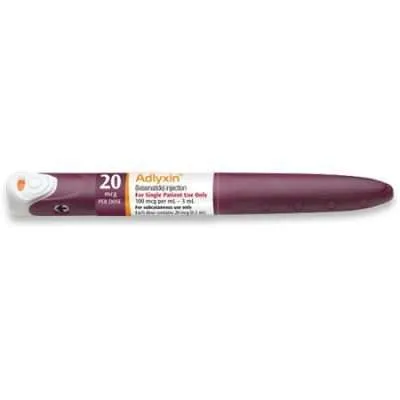Adlyxin (Lixisenatide) 100 mcg / ml
$200.00 – $570.00
Adlyxin Lixisenatide
Reasons to buy

Adlyxin (Lixisenatide) 100 mcg / ml
Limitations of Use:
- Adlyxin has not been evaluated in patients with pancreatitis or a history of pancreatitis
- Adlyxin is not indicated for those with type 1 diabetes mellitus (T1DM)
- Adlyxin has not been evaluated in those with gastroparesis and is therefore not recommended in these patients
HOW DOES ADLYXIN WORK?
Incretins are peptide hormones originating from the gut that are quickly released after a meal. The two primary incretins in humans include glucose-dependent insulinotropic polypeptide and glucagon-like peptide-1 (GLP-1). Incretins such as GLP-1 potentiate glucose-dependent insulin release and exert multiple antihyperglycemic effects after their secretion from the gut into the circulation.
Adlyxin is a GLP-1 receptor agonist that elevates glucose-dependent insulin release by
pancreatic beta-cells, lessening abnormally elevated glucagon release and decreasing gastric emptying. Through this mechanism, it improves glycemic control in patients with type 2 diabetes.
SIDE EFFECTS
Common side effects associated with Adlyxin include:
- Gastrointestinal symptoms (e.g. nausea, vomiting, and diarrhea)
- Antibody development
- Injection site reactions such as pain, erythema, and pruritus
- Headache
- Dizziness
WARNINGS AND PRECAUTIONS
Hypersensitivity Reactions
Adlyxin has been shown to cause serious hypersensitivity reactions that manifest as anaphylaxis and angioedema. Patients with a history of hypersensitivity reactions with other GLP-1 receptor agonists should be closely observed for allergic reactions. If anaphylaxis or angioedema occur, Adlyxin should be stopped and the patient should seek medical attention.
Acute Pancreatitis
Both fatal and non-fatal hemorrhagic or necrotizing acute pancreatitis cases have been reported in post-marketing data. Patients should be monitored for pancreatitis signs, such as abdominal pain or vomiting. If these symptoms occur, Adlyxin should be stopped immediately and the pancreatitis should be managed appropriately. Therapy with Adlyxin should not be reinitiated in the presence of true pancreatitis.
Never Share Pens
Adlyxin pens should never be shared with others even if changing the needle. If pens are shared, patients are at high risk of transmitting blood-borne pathogens.
Hypoglycemia with Concomitant Use of Insulin Products
Adlyxin can cause hypoglycemia when used concomitantly with products that decrease blood glucose (e.g. insulin). Dose adjustments to insulin may be required to prevent development of hypoglycemia. Patients should be aware of other drugs that can increase the glucose-lowering effects of Adlyxin and cause hypoglycemia. Patients should also be counseled on typical signs and symptoms of low blood sugar.
Acute Kidney Injury
Worsening chronic renal failure and acute kidney injury has occurred in patients treated with Adlyxin. Some reports included patients that did not have awareness of underlying renal disease. Most of these occurrences happened in those experiencing nausea, vomiting, dehydration, or diarrhea. Providers should monitor renal function when starting Adlyxin or increasing the patient’s dose, specifically in those with renal impairment or serious gastrointestinal reactions. Adlyxin should not be used in patients who have end stage renal disease.
Immunogenicity
Patients can have anti-lixisenatide antibodies following treatment with Adlyxin. The presence of antibodies has been associated with an attenuated glycemic response. If glucose control worsens or glycemic targets are not reached, providers should switch patients to another therapy.
DRUG INTERACTIONS
Delayed Gastric Emptying Effects on Oral Medications
Adlyxin slows gastric emptying thus decreasing the absorption rate of other oral medications. Providers should be careful when prescribing oral medications with narrow therapeutic ranges that need close monitoring. If these medications are taken with food, individuals should take them when Adlyxin is not also being taken.
Medicines that rely on threshold concentrations like antibiotics or acetaminophen should be taken a minimum of one hour prior to Adlyxin injection. Patients taking oral contraceptives should ingest the contraceptives at minimum one hour prior to Adlyxin injection or 11 hours post-Adlyxin injection
Hypoglycemia with Concomitant Use of Insulin Products
Adlyxin can cause hypoglycemia when used in combination with other products that lower blood glucose, such as insulin. Dose adjustments to insulin may be required to prevent development of hypoglycemia. Patients should be aware of other drugs that can increase the glucose-lowering effects of Adlyxin and cause hypoglycemia. Patients should also be counseled on typical signs and symptoms of low blood sugar.
SPECIFIC POPULATIONS
Pregnancy
There is not much data available on Adlyxin in patients who are pregnant and the drug’s potential to cause birth defects and miscarriage. However, there are many risks associated with poorly controlled diabetes during pregnancy. The risk-benefit should be considered by the provider, as poorly controlled diabetes during pregnancy can lead to birth defects, stillbirth, or complications.
Lactation
No data is available on Adlyxin’s presence in human milk, effects on breastfed infants, or milk production. Lixisenatide is present in rat milk. Providers should consider the benefits of breastfeeding and weigh them with the risks of potential adverse events of breastfeeding while on Adlyxin.
Pediatrics
Adlyxin has not been studied in pediatrics. Thus, efficacy and safety has not been established in younger patients.
Geriatrics
In clinical trials, there was no difference in safety or effectiveness between younger patients and patients older than 65 years of age. However, increased sensitivity in geriatric patients cannot be discounted.
Renal Impairment
Adlyxin should not be dose-adjusted in patients with mild or moderate renal impairment. Those with serious renal impairment should be monitored for symptoms of adverse gastrointestinal reactions and for alterations in renal function. Adlyxin is not recommended in end stage renal disease (eGFR <15 mL/min/1.73 m2).
| Quantity | 0.1mg/mL – 2 pens, 0.1mg/mL – 4 pens, 0.1mg/mL – 6 pens, 50mcg/mL – 1 pens, 100mcg/mL – 2 pens |
|---|
